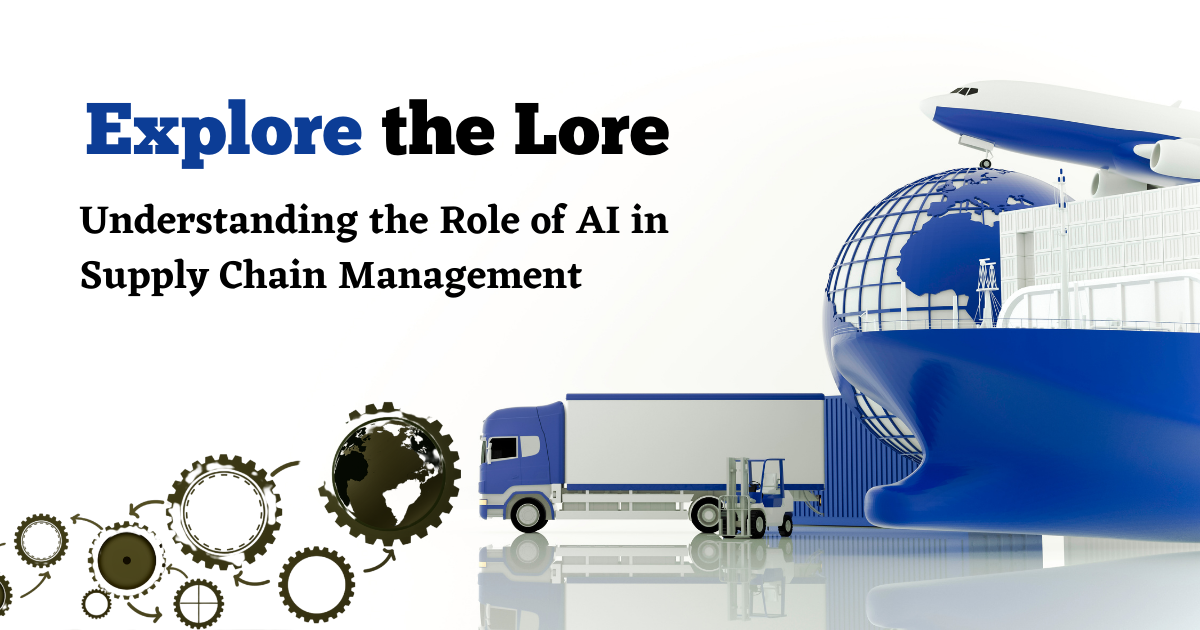The importance of Artificial Intelligence in supply chain management lies in its ability as it helps to automate tasks, analyze vast amounts of data for its further processing, provide intelligent solutions. It also plays crucial role in transforming and enhancing supply chain management practices. It offers various advantages and opportunities to improve operational efficiency, optimize decision-making and drive strategic advancements.
Artificial Intelligence helps supply chain management in different ways. Here are some advantages of AI :-
1) Demand Forecasting :- Artificial Intelligence in supply chain management helps in knowing vast amounts of factual data and market trends to forecast demand accurately. This enables organisations to optimize inventory levels, reduce stock-outs and avoid excess inventory which leads to more customer satisfaction.

2) Inventory Optimization :- By implementing AI algorithms, supply chain personnal can optimize inventory levels based on demand patterns, seasonality and other variables. This ensures that the right amount of inventory is available at the right time and in the right locations.
3) Enhanced Productivity :- Artificial Intelligence in supply chain management can automate repetitive and time-consuming tasks in the supply chain, such as order processing, shipment tracking, and invoice reconciliation. This allows supply chain professionals to focus on strategic activities, decision-making and problem-solving, thereby improving overall efficiency and productivity.
4) Transparency in Supply Chain :- AI-powered systems can integrate data from various sources, including suppliers, logistics providers to provide real-time visibility and transparency across the supply chain. This enables stakeholders to track inventory and monitor delivery status.
5) Improved Customer Satisfaction :- What if you find the parcel at your doorstep just after few seconds of placing order? as we said earlier, the new customer expects fastest delivery. Integration of AI in SCM can actually enhance the delivery steps faster than ever and this leads to improved customer experience.
6) Warehouse Management :- AI-powered technologies such as robotics and automation can improve efficiency in warehouse operations. Autonomous robots can navigate warehouses, picking and packing orders, thereby reducing human error and increasing speed and accuracy. AI systems can also optimize warehouse layouts and streamline processes, improving inventory visibility and reducing costs.

7) Risk Management :- Artificial Intelligence in supply chain management provides guidance in analyzing data from multiple sources like past weather patterns, political events and market dynamics to identify potential risks and problems which can occur in the supply chain. With this information, organizations can proactively mitigate risks, develop future plans and enhance supply chain resilience.
8) Supplier Relationship Management :- Artificial Intelligence in supply chain management can streamline supplier selection, evaluation, and performance monitoring processes. By analyzing supplier data, historical performance, and market information, AI systems can identify the most suitable suppliers, negotiate optimal contracts, and ensure compliance with quality and delivery standards.
9) Supply Chain Optimization :- Artificial Intelligence algorithms can optimize complex supply chain networks by analyzing different factors such as transportation costs, capacity of our production and locations of the customer. By considering these variable factors, AI can recommend optimal routes, production schedules, and distribution strategies, leading to cost reductions and improved service levels.
10) Continuous Improvement and Predictive Analytics :- Artificial Intelligence in supply chain management provides assistance to analyze data and identify patterns, trends, and anomalies in the supply chain. This enables organizations to identify areas for improvement, optimize processes and implement predictive analytics to anticipate future demand, optimize capacity, and proactively resolve issues before they occur.
Despite of its importance in Supply Chain Management, AI also has some disadvantages:-
1) Data Security Issues :-
One of the biggest challenge to integrate AI in industry is how data is handled? As AI require huge amounts of data to provide accurate results. It’s a matter of security, do you think we should give confidential company data to AI? Will it be possible for AI to reveal that information unintentionally. So as, we can expect growth in cybersecurity jobs that specialize in AI compliance and security.
2) Causes Unemployment :-
Unemployment caused by AI is a topic of significant concern these days. Certain routine & repetitive task, which can easily be performed by AI tools is resulting in less jobs which is causing unemployment.
3) High Implementation Costs :-
Looking for a new technology when it is not so common in supply chain industry will require huge amount of investments. A custom AI software alone could cost very high and can indeed involve significant costs which could not suit some small companies or startups.
To conclude, Artificial Intelligence in supply chain management offers the potential for increased efficiency, cost savings, improved decision-making, enhanced visibility and better customer satisfaction. We have explored the transformative role of Artificial Intelligence in supply chain management along with its benefits and drawbacks. AI empowers businesses to make data-driven decisions, optimize operations and enhance customer experiences. Nevertheless, it is sure that AI is revolutionizing the supply chain landscape like never before.

